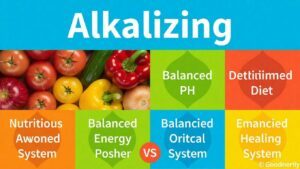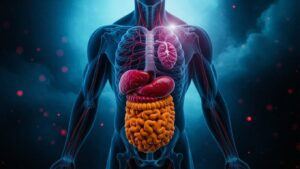 There is a common belief that alkalizing the body can improve health, but the body naturally maintains a stable pH level through the lungs and kidneys. Eating more alkaline foods (like vegetables and fruits) is generally healthy.
There is a common belief that alkalizing the body can improve health, but the body naturally maintains a stable pH level through the lungs and kidneys. Eating more alkaline foods (like vegetables and fruits) is generally healthy.
Keeping our body’s pH levels balanced can be like walking a tightrope. More health enthusiasts these days are talking about the benefits of alkalizing your body. But what’s the real deal here? Does sipping on alkaline water and munching on greens actually do what people claim? Let’s break down some of the science and theories behind it.
The idea is pretty simple: our body’s pH level ranges from acidic to alkaline, and most of us hover somewhere in the middle. When your body leans towards being alkaline, the thought is that you feel more energized, your digestion is improved, and your immune system is partly bolstered. It’s not just a modern phenomenon either. Cultures worldwide, think the ancient Greeks and their love for balance, have long held beliefs about bodily balance being a key to health.
Now, is there science backing this up? Well, it’s a mixed bag. Some research suggests that an alkaline diet can indeed neutralize acid in the bloodstream and prevent chronic diseases. However, a lot of this is tangled with broader lifestyle changes, like eating more veggies and cutting out junk food. In fact, switching up your diet to be mostly alkaline does often mean you eat better foods overall. Leafy greens, nuts, seeds, and legumes, for example, are universally praised for good nutrition.
And then, there are those who suggest there’s much ado about nothing. Critics point out that our bodies have their own clever mechanisms to regulate pH without dietary measures. Instead of immediate changes, what’s more important is understanding how different foods and activities can cumulatively affect how you feel — kind of like building a health snowball.
One thing’s clear though. People touting the benefits of alkalizing often report feeling less bloated and more energized, and who doesn’t want that? So, it’s no surprise this has become a popular topic. If nothing else, adopting an alkaline diet can inspire some healthier habits.
Physiological Impacts: What Happens to the Body When It Is Alkaline?
 If the body becomes too alkaline (a condition called alkalosis), it can cause muscle twitching, nausea, confusion, and even severe health issues. However, in normal circumstances, the body regulates pH effectively, keeping blood pH slightly alkaline (around 7.35-7.45).
If the body becomes too alkaline (a condition called alkalosis), it can cause muscle twitching, nausea, confusion, and even severe health issues. However, in normal circumstances, the body regulates pH effectively, keeping blood pH slightly alkaline (around 7.35-7.45).
A highly alkaline state (alkalosis) can be harmful, but eating more alkaline foods can indirectly support health by increasing nutrient intake and reducing inflammation. However, this is due to the nutritional value of those foods, not necessarily their alkalinity.
Our bodies are pretty amazing at keeping everything in balance, always working to maintain that perfect pH level. But what happens when we help tip the scale a little more toward alkaline? Well, a few interesting things start happening.
People claim that when your body’s more alkaline, everything ticks along a bit smoother. For instance, digestion gets a helping hand. An alkaline diet is rich in fiber-loaded foods, which naturally aid your digestive system in keeping things regular and happy.
Inflammation, the pesky culprit behind many chronic conditions, can also take a backseat when you’re riding the alkaline wave. Foods that promote alkalinity often have anti-inflammatory properties that can offer a nice respite to swelling and discomfort, especially in joints.
Energy levels? Folks say they get a noticeable boost when embracing alkalinity. This might be because shifting towards an alkaline state usually means consuming higher-quality foods that provide sustained energy rather than quick energy bursts and crashes.
But let’s not forget about the potential downsides. Pushing too hard towards high alkalinity can sometimes mess with your natural balance, potentially even impacting kidney function if you overdo it with alkaline supplements or certain diet changes. Moderation, as always, is the name of the game.
When you’re considering giving this whole alkalinity thing a go, it’s smart to take a step back and see the big picture. Focusing on a balanced diet filled with a rainbow of fruits and veggies, rather than just aiming for alkalinity, often leads to a more sustainable and enriching lifestyle.
Practical Approach: How Do You Know If Your Body Needs Alkaline?
 Figuring out whether your body needs a little alkaline boost isn’t as complicated as you might think. It starts with tuning into your body and recognizing some subtle signs. You know that feeling after a weekend of indulging? Often, when our body is a bit too acidic, it might let us know through fatigue, constant bloating, or even skin breakouts. So paying attention to these whispers can be key.
Figuring out whether your body needs a little alkaline boost isn’t as complicated as you might think. It starts with tuning into your body and recognizing some subtle signs. You know that feeling after a weekend of indulging? Often, when our body is a bit too acidic, it might let us know through fatigue, constant bloating, or even skin breakouts. So paying attention to these whispers can be key.
Your body doesn’t usually need external help to become more alkaline. However, if you have excessive acidity (acidosis), symptoms like fatigue, shortness of breath, and confusion can occur. If you’re concerned, a doctor can check your blood pH and metabolic balance.
Monitoring your pH levels can be a hands-on way to get some insight. There are simple pH test strips available out there, which you can use at home with saliva or urine to see where you stand. While they’re not foolproof or definitive, they can give a general idea of whether your lifestyle shifts are making a difference.
Once you’ve got an inkling that your body might need more alkaline, tweaking your diet is a straightforward place to start. Think colorful veggies, fresh fruits, and whole foods. Simple swaps, like trading sugary snacks for almonds or tossing more spinach into your meals, can make a difference over time.
Beyond diet, lifestyle factors do the heavy lifting too. Regular exercise helps keep everything ticking smoothly, and managing stress through relaxation techniques can prevent the body from becoming over-acidic due to cortisol spikes. Even your morning yoga or a serene walk can contribute to alkalinity balance.
Keeping tabs on how these adjustments make you feel is as crucial as the steps themselves. Notice if there’s more pep in your step or if those pesky afternoon drags are becoming less frequent. These little victories can mean the changes are doing their thing.
So, when you’re thinking about alkalizing, it’s all about being observant, making thoughtful choices, and keeping things balanced.
Tips on a balanced, pH-friendly diet

A balanced, pH-friendly diet focuses on whole, nutrient-dense foods that support overall health while keeping your body’s natural pH balance in check.
Here’s how you can achieve that:
🌿 Alkaline-Promoting Foods (Good for Overall Health)
These foods are rich in vitamins, minerals, and antioxidants:
✅ Vegetables – Spinach, kale, broccoli, cucumbers, celery
✅ Fruits – Lemons, limes, avocados, watermelon, bananas
✅ Legumes & Beans – Lentils, chickpeas, black beans
✅ Nuts & Seeds – Almonds, flaxseeds, chia seeds
✅ Herbal Teas – Green tea, chamomile, ginger tea
🍗 Acidic Foods (Okay in Moderation)
These foods don’t necessarily make you unhealthy but should be balanced:
✔ Animal Proteins – Chicken, fish, eggs (choose lean options)
✔ Dairy – Yogurt, cheese (opt for fermented dairy)
✔ Grains – Brown rice, quinoa, whole wheat
✔ Healthy Fats – Olive oil, coconut oil
❌ Highly Acidic Foods (Limit for Optimal Balance)
🚫 Processed foods (chips, fast food, sugary snacks)
🚫 Excess red meat & processed meats (bacon, sausages)
🚫 Sugary sodas, energy drinks, excessive coffee
🚫 Alcohol in large amounts
💡 Easy Tips to Stay Balanced
- Drink lemon water (despite being acidic, it has an alkalizing effect in the body).
- Eat more veggies with every meal.
- Reduce processed foods and refined sugars.
- Stay hydrated—water helps flush out excess acidity.
- Manage stress—chronic stress can contribute to acidity.

